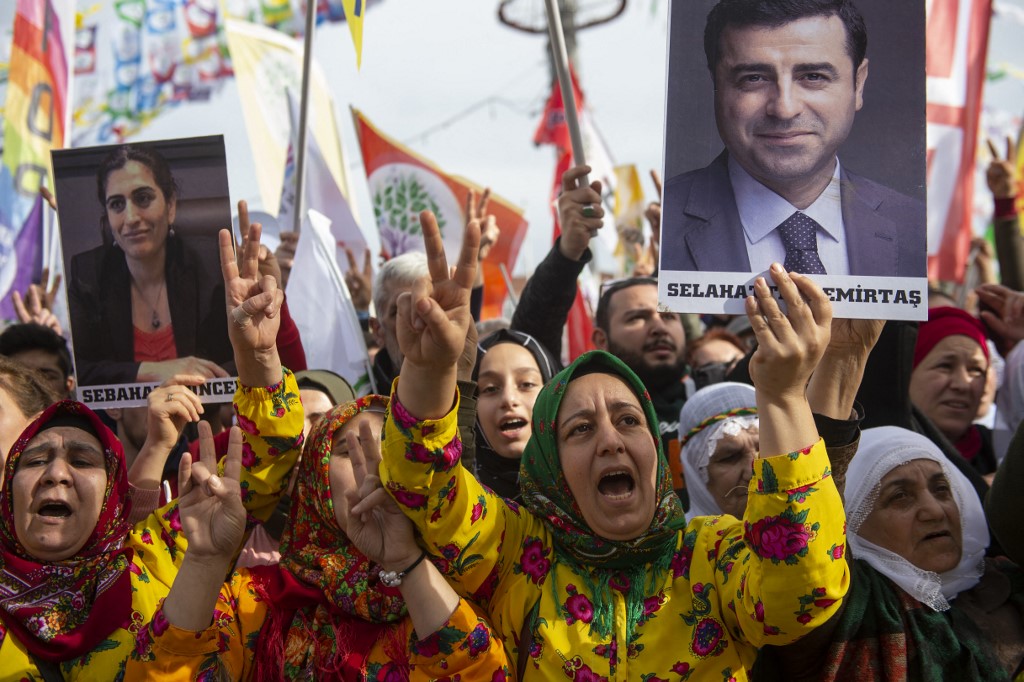As Turks prepared to celebrate the 100th anniversary of the founding of their republic, a recent survey by Kurdish Barometer, an initiative of the nonprofit Kurdish Studies Center, found that the majority of Kurds in the country believe there is “a “Kurdish issue” in Turkey, caused, they say, by the state’s non-recognition of Kurdish identity, Voice of America’s Turkish service (VOA Türkçe) reported.
The Kurdish issue, a term prevalent in Turkey’s public discourse, refers to the demand for equal rights by the country’s Kurdish population and their struggle for recognition.
Kurdish Barometer assesses social change and transformation within the Kurdish community in Turkey. The center provides data on Kurds that is not available in official statistics in a bid to guide decision-makers, academics and the media.
The Republic of Turkey was founded on October 29, 1923, after a war of independence against the Allied occupiers who had crushed the Ottoman Empire at the end of World War I. Its founder, Mustafa Kemal Atatürk, a general in the defeated Ottoman army, developed a nationalism inspired by the ideas of French Enlightenment intellectuals.
The Turks were not the only ethnic group in the empire, however, and so a process of nation-building occurred in which ethnic minorities bore the brunt. The Kurds, the most populous ethnic minority in the country, rebelled against the state in a series of uprisings that culminated in the ongoing armed insurrection in 1984.
Today, Kurds make up around 20 percent of the population. The group has faced a long history of discrimination and violence in the country. They are often pressured not to speak their native language. Authorities frequently claim that people speaking in Kurdish are actually chanting slogans in support of the outlawed Kurdistan Workers’ Party (PKK), which has been leading an armed insurgency against Turkey’s security forces since 1984 in a campaign that has claimed the lives of some 40,000 people.
A hundred years later, the non-recognition of the Kurds persists
According to VOA Türkçe, Kurdish Barometer conducted 1,492 face-to-face interviews in 20 provinces of Turkey. Topics covered include identity, the Kurdish question, demands, discrimination practices, politics, mother tongue and popular culture.
The survey found that 51.5 percent of Kurds believe there is a ‘Kurdish issue in Turkey, and 51 percent attribute this issue to the “non-recognition of Kurdish identity.”
According to the survey 67.4 percent of Kurds embrace their Kurdish identity, while 60 percent believe they face discrimination due to their Kurdish identity.
The survey found that 44.1 percent of Kurds believe education should be bilingual, in both Turkish and their mother tongue, while 27 percent think education should be in Turkish, but the mother tongue should also be taught separately.
Prohibitions against the use of Kurdish in Turkey go back many years. Kurdish language, clothing, folklore and names had been banned since 1937. The words “Kurds,” “Kurdistan” and “Kurdish” were among those officially prohibited. After a military coup in 1980, speaking Kurdish was officially forbidden even in private life.
Almost half of the respondents, 48 percent, said they believe that Turks and Kurds are not treated equally by the government.
According to the survey, two-thirds of Kurds believe that Kurdish should be recognized as an official language, while the level of hope for Turkey’s future is quite low. Sixty percent of respondents believe that the government’s efforts to solve the Kurdish issue are insufficient.
Sixty-one percent of respondents believe that “there should be an office in the United Nations to represent the Kurds,” and 61 percent believe that the Kurds would live in better conditions if Turkey were to become a member of the European Union.
Former pro-Kurdish Peoples’ Democratic Party (HDP) co-chair Selahattin Demirtaş ranked first in responses to the “Most Admired Political Leader” question with a score of 6.9 out of 10. Kemal Kılıçdaroğlu, who was supported by the Kurds in the May presidential election, and President Recep Tayyip Erdoğan received 4 points each.
Demirtaş has been imprisoned since 2016 on terrorism-related charges. He was an outspoken critic of Turkey’s ruling Justice and Development Party (AKP) and its leader, President Erdoğan, before he was jailed. Demirtaş’s imprisonment continues despite rulings of the European Court of Human Rights (ECtHR) urging his release.
The AKP launched talks with the outlawed PKK leadership in 2012 in a bid to resolve the Kurdish issue, but the talks collapsed in 2015, after which the government allied with a far-right nationalist party and adopted a nationalist discourse, which further disenchanted Kurds.
The AKP then increased its crackdown on Kurds.
Last week, former Turkish president Abdullah Gül said the Turkish government’s failure to resolve the Kurdish issue has turned it into a regional problem that is open to manipulation by international powers.
Gül said if Turkey had been able to resolve the Kurdish issue by granting more extensive democratic and fundamental rights and freedoms to the country’s Kurds, this would have strengthened Kurdish citizens’ loyalty and feeling of belonging and prevented the issue from becoming a regional problem that is open to the manipulation of international powers.
The former president’s remarks come at a time when Turkey is carrying out airstrikes in northern Iraq and northeast Syria against alleged PKK targets in retaliation for a terrorist attack in Ankara on Oct. 1 that injured two police officers.
Kurdish authorities in Syria accuse Turkey of causing dozens of civilian deaths and destroying crucial infrastructure in its airstrikes on Syria.

